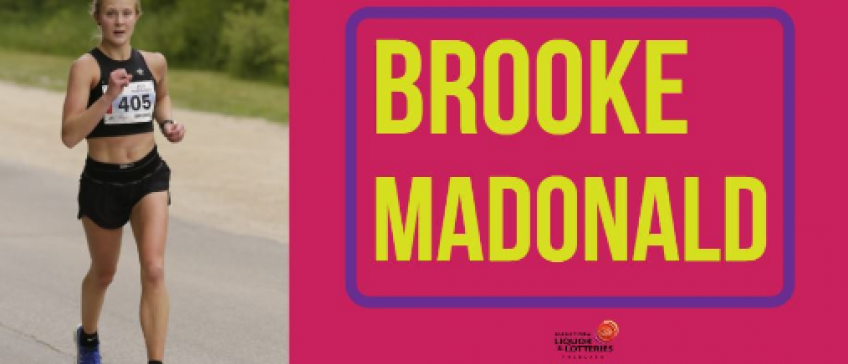Brooke MacDonald is no stranger to 26.2, but this year she toed the start line in front of IG Field for the first time. She was coming off of a great half at the Saskatchewan Marathon and she was poised for a chase: she finished behind winner Selene Sharpe managing to overtake Nicole Walker and clinch second by thirty seconds. As she continues to focus herself as a marathoner to watch, Brooke talks about her schedule and really digs into details of her training as well as her process to set and build her goals.
This was your first Manitoba Marathon: how was your first experience joining us on Father’s day?
My first experience at the Manitoba Marathon was a very positive one! In regards to keeping the athlete as first priority, the race volunteers and organizers couldn’t have done a better job. The race itself had an electric atmosphere, which I know can be challenging over 42.2km. There was not once during the race where I felt alone!
You finished first female in the Half in May at the Saskatchewan Marathon. Did that event feel like a good pace check for you to give you some confidence for Manitoba?
Definitely! Although I don’t have a ton of experience with the marathon distance, I know from racing in university the importance of running races before a goal race. There is something about the atmosphere that can always help us reach another level. Running a half marathon 3-5 weeks before a goal marathon can be a good indicator of the fitness you have going into your goal race. Once I ran 1:23:01 in Saskatoon, I knew breaking 3 hours could be possible in Winnipeg on a good day.
This was only your third marathon and you have now shaved seven minutes off your first time, four of those minutes since GMS Queen City Marathon in 2018. What do you attribute these gains to?
If you look anywhere for information about the marathon distance one of the most common themes that come up are that experience plays a huge role in learning to race the distance properly. For my first marathon, I know I was not both mentally or physically prepared for the distance. I was humbled completely when, with 10 kilometers to go, I was completely spent. Going into my second marathon, I safely built my mileage to a higher weekly overall volume and ran the race much smarter: starting much slower and eventually racing the second half at a faster pace. For my marathon build up this spring, I focused on both increasing my mileage but also adding on more marathon-paced miles to my long runs. It is nearly impossible to simulate the fatigue you feel 37km into a marathon, but running 90 minutes at marathon pace after already running for an hour is the closest you can get! I felt confident that after several long runs ending in marathon pace (working up to 2 hours @ 4:14/km at the end of a 37km run), I knew I could tackle the distance.
You competed with the University of Saskatchewan track team until 2017. How do you feel that the training and practice you had there have influenced your independent training?
Running for the Huskies helped my training in many ways. At the university level, the coaches know you are busy but expect you to put in the effort at practice despite a heavy course load. This correlates to training at a high level while working full time. Now nobody is there videotaping my 5am runs, it is the intrinsic motivation, the same type I cultivated in university that makes me a better runner.
You competed in your first full marathon in 2018 at the Saskatchewan Marathon taking over the title from Erin Gardiner who had held the win the past five years. How did it feel to take such a big win on your first attempt?
It was liberating! I had the goal to run the race hard and win, but at the back of my mind my “A” goal was just to finish the race wanting to run a marathon again. If I placed well, that was just a bonus. I wouldn’t change any part of the day – even going out too hard from the start, because every mistake I make during my races I can add to my toolbox and on the right day it will all come together.
Now that you work full time as a pharmacist and train in your spare time, how do you balance all of your commitments?
Running has to happen before work or it doesn’t happen. I am typically up at 5am on work days (and most weekends) to get my run in before my work. Being a pharmacist means being on your feet for 8-12 hours per day, which makes training after work extremely challenging. I also know that if I get my training done in the morning, if something comes up at work or home where I need to allocate more of my time, I can do so without guilt.
What role does nutrition play in your training? Are you very strict with your diet or do you tend to be a bit more free with it? Does this change as you get closer to a race date?
Haha, I am definitely more free with my diet. In high school and in my early years of university I was much more strict, but I have learnt that there are different ways to properly fuel my body and different things work for different people. I let the training dictate how I am eating. Nothing changes as I get closer to race date, other than I practice eating my pre-race breakfast and fueling more often. Because I start my run so early in the day, I usually don’t eat beforehand unless it is a run longer than 2 hours.
How about on the run? How do you fuel for optimum output on race day?
I honestly switch up my breakfast. I have tried out many different breakfasts – toast, oatmeal, pancakes, french toast and I haven’t had an issue with any of them. Not everyone is as fortunate, but it sure helps me on race morning when I am in an unfamiliar place.
What was the most personally challenging race you have ever run and why?
Probably my first full marathon. Although each marathon I have run has been extremely challenging, I just think I did not respect the distance enough. I went out way too quickly and was toast by 30km. Never in my life have I told myself I just needed to get through the last 12km. It was just the strangest feeling. Never in my life have I felt that type of fatigue after training hard for an event. The marathon us humbling, that is for sure, that is why we see athletes even at the elite level struggle to complete the event.
What goals have you set for yourself for the next year and what is your training focus to help get you there?
Each year I just set small, micro goals which are designed to lead me to my ultimate goals. At the start of each year, I write out my goals and have them on a board in our workout room by my treadmill. This year, my goals will probably be to run a 1:21 half marathon and 2:57 marathon. Last year, I had a paper on my treadmill that had “4:15/km” on it, which was the pace I needed to run for 42.2km to break 3 hours. I ran 2:59:51 this year. I had seen the pace and practiced it so many times, that in my mind I had already run it. Safely increasing my mileage and just staying consistent will be my methods to reach this goal. It is no surprise when elite endurance athletes peak later in life, it is the consistent accumulation of mileage year after year that makes great marathoners. A marathoner is not made in one good training block alone. Just by enjoying the process and putting in the work day after day will help me achieve the goals I have for myself in the years to come.
If you could have anyone pace you for your next marathon, who would it be?
Sara Hall for sure. She is gritty, brave, and races for all the right reasons!
What advice do you have for someone who is thinking about working towards a marathon distance?
Make sure this is something you really want to do. Marathon training can be a large commitment, and if you are only running to reach a goal it won’t be sustainable. You have to love the day in and day out grind, the early mornings, and be able to carve out 3 hours on a Sunday morning every week for a long run. If you love the training, when it is -40 and you have to move your 3 hour run onto a treadmill you will have the discipline and drive to do so, purely out of love and passion for the sport.

